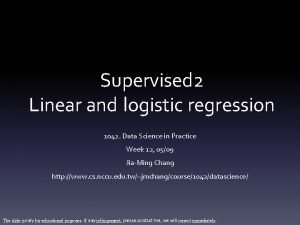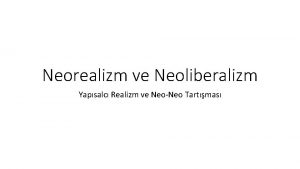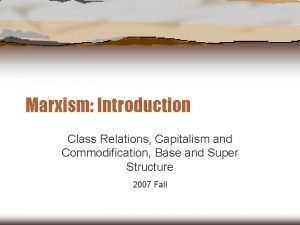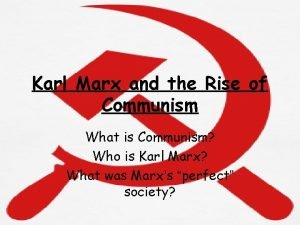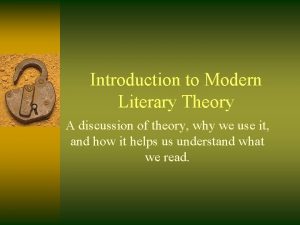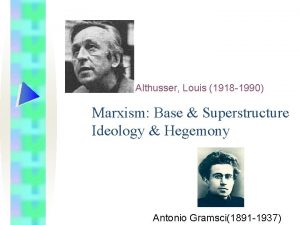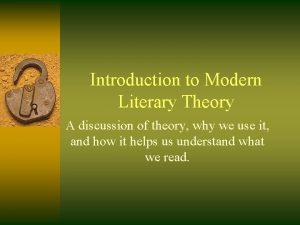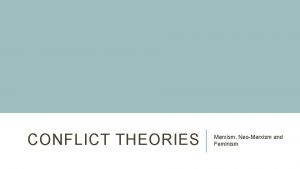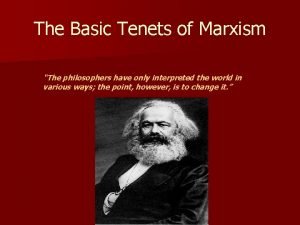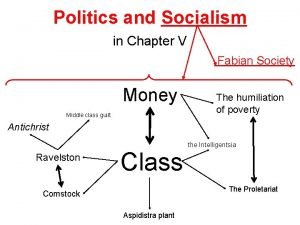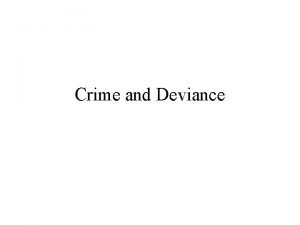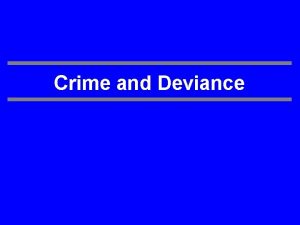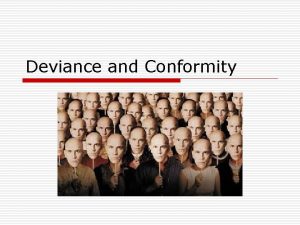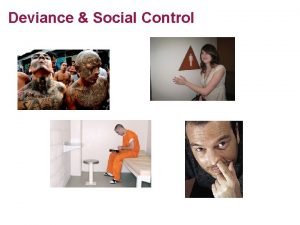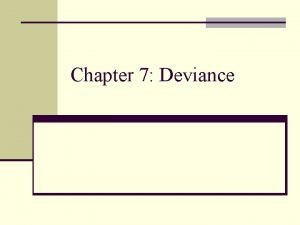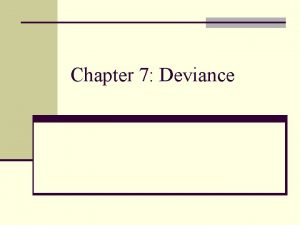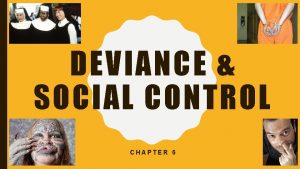Neo Marxism view on crime and deviance Neo














- Slides: 14

Neo Marxism view on crime and deviance

Neo Marxism is humanistic • As it relates more to social action and interactionism and looks at the effects of capitalism on individuals. It believes we have free will, we have an active choice to let capitalism continue in our society • This approach focuses less on structure than previous views. It is more humanistic, this means that the w/c are aware of their oppression and consciously accept/ consent to the dominant ideology

Gramsci: hegemony

• In modern society it is imperative to have ‘consent’ to the hegemonic rule, this is fathered through ideologies promoted through education and media as well as other institutions. But this hegemony isn’t always certain • This view argues that the proletariat can realise they are being exploited so the ruling class need to win them over by a degree • At times when the w/c are stronger, the bourgeoisie need to appease them to prevent a revolution eg after the war many reforms were passed to reward the w/c eg the nhs, welfare etc to prevent a revolution of the proletariat • Complete false class consciousness doesn’t exist • His concept of hegemony, rule by winning consent, maintains that complete ideological dominance is achieved so the ruling class have to grant concessions to the w/c to convince them that they are working within their interests

The ruling class maintain dominance through • Coercion: use the army, police, prisons, courts of the capitalist state • Consent (hegemony): ideas and values to persuade the subordinate classes and its rule as legitimate

Taylor et al: the new criminology

• Taylor et al agree with Marxists that: • Capitalist society is based on exploitation and class conflict and characterised by extreme inequalities of wealth and power. Understanding this is the key to understanding crime • The state makes and enforces laws in the interests of the capitalist class nad criminalises members of the w/c • Capitalism should be replaced by a stateless society. This would greatly reduce the extent of crime or even rid society of crime entirely

Criticise traditional Marxism on the grounds that • It is too deterministic • Determinism: the idea that humans have no free will and that their thoughts and behaviour ae shaped or are caused by factors outside themselves, such as the social structure • Marxism is often accused of economic determinism. The view that the economic base shapes all other features of societys superstructure, such as social institutions and ideas. Determinism is the opposite of voluntarism

Taylor et al take a more voluntaristic view • Voluntarism is the idea that we have free will- the opposite of determinism. They see crime as meaningful action and a conscious choice by the actor • In particular, they argue that crime often has a political motive, eg to redistribute wealth from the rich to the poor • Criminals are not passive puppets whose behaviour is shaped by capitalism: they are deliberately striving to change society

A fully social theory of deviance • Taylor et al aim to create a fully social theory of deviance. A comprehensive understanding of crime and deviance that would help to change society for the better. This theory would have two main sources: • Marxist ideas about unequal distribution of wealth and who has the power to make and enforce the law • Ideals from interactionism and labelling theory about the meaning of the deviant act for the actor, societal reactions to it, and the effects of the deviant label on the individual • They believe that crime is a rational response to the inequalities generated by the capitalist system and some, particularly taylor, sees w/c crime as a political act against the state. They also focus on how stigmatised groups are labelled and targeted by the state in order to control them and use them as scapegoats

In their view, a complete theory of deviance needs to unite six aspects • 1: the wider origins of the deviant act in the unequal distribution of wealth and power in capitalist society (traditional marixism) • 2: the immediate origins of the deviant act – the particular context in which the individual decides to commit the act (interactionism) • 3: the act itself and its meanings for the actor – eg was it a form of rebellion against capitalism? (interactionism) • 4: the immediate origins of social reaction – the reactions of those around the deviant, such as police, family and community, to discovering deviance (interactionism) • 5: the wider origins of social reaction in the structure of capitalist society – especially the issue of who has the power to define actions as deviant and to lavel others, and why some acts are treated more harshly than others (traditional Marxism) • 6: the effects of labelling on the deviants future actions – eg why in some labelling leads to deviancy amplification in some cases but not others (mix) • Examples: womens liberation movement, gay liberation front, black power movement

A 03 of critical criminology • Been criticised for its emphasis of the political nature of crimes, which is not useful for explaining crimes such as domestic violence and child abuse • Only provided a framework and didn’t conduct any research themselves. The fully social analysis they advocated incorporates seven aspects of crime that were very complex • Left realists make two related criticisms: romanticises w/c criminals as robin hoods who are fighting capitalism by redistributing wealth from the rich to the poor, however in reality these criminals mostly prey on the poor. Ignores effects on w/c victims

Policing crisis and the link to neo marxism A fully social theory of crime and deviance taylor et al Policing crisis hall et al The wider origins of the deviant act 70 s was a period of considerable social crisis in Britain, the result of an international downturn in capitalist economies The immediate origins of the deviant act This turmoil was shown in a number of inner city roots, conflict in northern Ireland high levels of strikes. The government was searching for a group that could be a scapegoat to draw attention away from the crisis The act itself Mugging- which according to the police was more likely to be carried out by those from afro Caribbean backgrounds The immediate origins of social reaction Media outrage at the extent of muggings, links to racism amongst the metropolitan police The wider origins of social reaction The need to find scapegoats and the ease with which young men from afro Caribbean backgrounds could be blamed The effects of labelling A scale of injustice amongst ethnic minorities against the police led to much further hostility between them and further arrests

Link explained • w/c were threatening capitalism through strikes/civil unrests. The w/c were faining power causing a threat to capitalism/bourgeoisie- fighting against the status quo, threatened ruling class control • At times of growing oppression to capitalism the ruling class may need to use force to regain control. The use of forces has to be seen as legitimate or it may provoke even more widespread resistance. It it didn’t do this there would be a proletariat revolution to overthrow capitalism • Young w/c black males were scapegoated by the media to create a division between the proletariat to turn away from the real crisis. So they cant become powerful and cause a revolution against capitalism- instead they turn on each other. Black w/c males easy target as they were already seen as criminals prior to the label being attached to them • This turned attention away from other problems amongst the proletariat as both the police and media are institutions in the superstructure which pass on the dominant ideology and protect the interests of the ruling class • Media would report crime statistics to show a rise in muggings even though there was no real evidence to support this – the structure of capitalism automatically works to protect ruling class interests
 Marxism crime and deviance
Marxism crime and deviance Null deviance vs residual deviance
Null deviance vs residual deviance Crime and deviance sociology revision
Crime and deviance sociology revision Chapter 7 deviance crime and social control
Chapter 7 deviance crime and social control Difference between crime and deviance
Difference between crime and deviance Theory of deviance
Theory of deviance Neo neo tartışması
Neo neo tartışması Base and superstructure in marxism
Base and superstructure in marxism Utopia and communism
Utopia and communism Advantages and disadvantages of marxism
Advantages and disadvantages of marxism Examples of superstructure marx
Examples of superstructure marx Derrida deconstruction
Derrida deconstruction Marxism and feminism similarities
Marxism and feminism similarities Tenants of marxism
Tenants of marxism Fabianism vs marxism
Fabianism vs marxism

